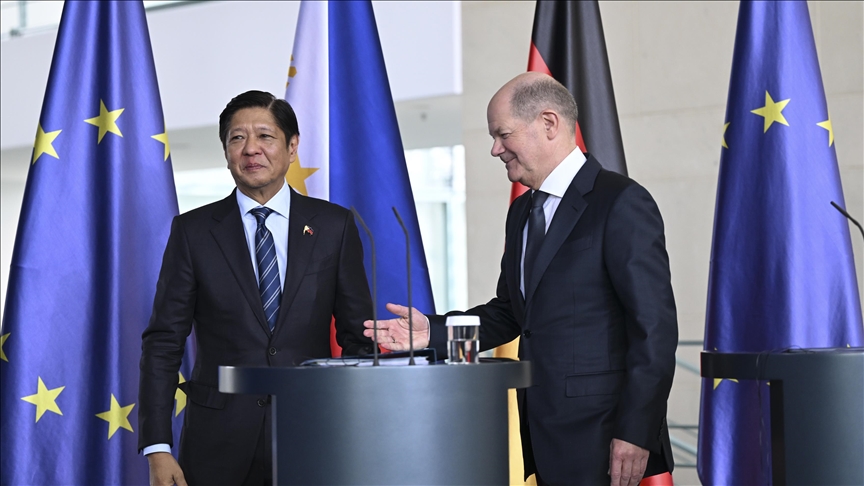Germany’s Scholz calls for diplomacy, de-escalation in South China Sea
Chancellor says competing territorial sovereignty claims should be resolved peacefully in compliance with international law
 German chancellor Olaf Scholz (R) and Philippines President Ferdinand Romualdez Marcos Jr. (L) hold a joint press conference following their meeting in Berlin, Germany on March 12, 2024.
German chancellor Olaf Scholz (R) and Philippines President Ferdinand Romualdez Marcos Jr. (L) hold a joint press conference following their meeting in Berlin, Germany on March 12, 2024.
BERLIN
German Chancellor Olaf Scholz on Tuesday called on China and regional countries to resolve tensions in the disputed South China Sea peacefully.
Speaking at a joint news conference with Philippine President Ferdinand Marcos Jr., Scholz said they have discussed the latest developments in the region, and increased tensions in the South China Sea.
“This is about adhering to international law, ensuring the freedom of navigation. We are working to ensure that the UN Convention on the Law of the Sea (UNCLOS) is being adhered to by all its parties,” Scholz said.
“We want to do whatever we can to help settle tensions in a peaceful manner. Therefore, ASEAN’s negotiations on a code of conduct for the South China Sea is therefore of the utmost importance, de-escalation must always be our priority,“ he added.
“We have the UNCLOS, we have an arbitral tribunal which is in Hamburg. Important judgments have been passed over the course of the year. I believe it to be very important that each and every one adheres to the legislation in place,” Scholz said.
Marcos Jr. said his country is committed to a rules-based international order, wants to solve problems through dialogue, but is also determined to defend its sovereign rights.
"We have not rejected any proposals that China has made to us, but the premise is something that we question," he said, when asked about Philippine’s response to Beijing’s recent maritime-related proposals.
"That premise that China has made is that their territory follows what is now described as a 10-Dash line. This is not recognized by any country, any international body, certainly not by the Philippines,” he stressed.
Marcos Jr. said discussions with Beijing would not forward if China insists on its conditions.
“When I took office, I took an oath to defend and support the constitution of the Philippines. The first article of the constitution of the Philippines is the article that describes and defines the territorial area,” he said.
“It is my duty, I have no choice, but to defend that, and we will continue to do that," he added.
Beijing claims a vast maritime territory in the South China Sea, and the two countries have seen new tensions in recent months in the disputed yet mineral-rich waters.
In 2016, China was dealt a blow when the Permanent Court of Arbitration (PCA), an international tribunal based in The Hague, ruled that Beijing’s nine-dash line claim has no legal basis under international law.
China says the ruling is not valid and has been in negotiations with ASEAN since 2002 for a code of conduct for the disputed sea.








